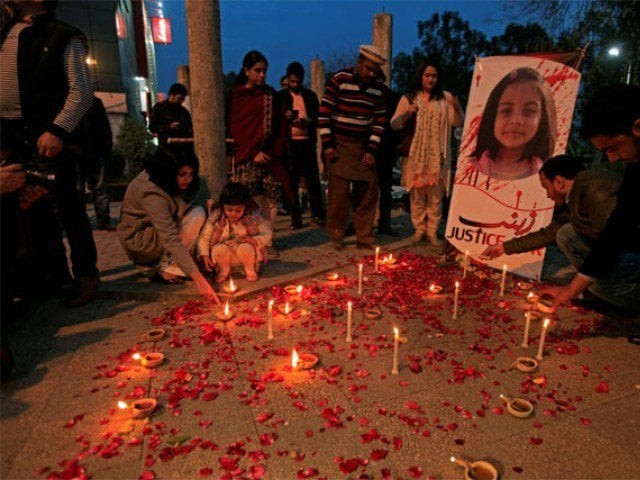Pace of Zainab murder trial lauded
Legal fraternity mostly happy over pace of proceedings

Legal fraternity mostly happy over pace of proceedings
PHOTO:Express
Member Punjab Bar Council Syed Farhad Ali Shah and prominent advocate Azhar Siddique said that they cannot remember any case in which a trial lasted for less than four days.
This speedy trial drew the admiration from the larger part of the legal fraternity. However, some reservations about the whole process were expressed by a few. For example, Siddiqiui pointed out that none of the prosecution witnesses actually saw the event taking place.
Family demands public execution of Zainab's murderer
Lahore High Court Bar Association Vice President Rashid Lodhi lauded the fact that the decision was taken in such a short span of time. He also claimed that the case fulfilled all the requisites of the right to a fair trial as per article 10-A of the Constitution of Pakistan.
He said that the suspect had confessed before the court and was provided copies of the charges framed against him free of cost. These charges were also read out before him. Evidence and witnesses were presented against him. Imran was also asked to present something in his defense, but he confessed instead. Analysis of the proceedings in the court confirmed that all the factors needed for a fair trial were fulfilled, he added.
Farhad also said that the conviction of Imran Ali was pronounced after following the due process of law. He said that this trial had proven that the cases can be decided early without unnecessary delays if there was a will. He also demanded that this precedent must be followed in his appeal before the Lahore High Court. He said that in case of conviction for murder charges, the law bound the jail superintendent to file an appeal before high court.
Siddique said that this conviction cannot be used as an example in other cases. To quote this case as a precedent, there will be a need to amend the law. The lawyer stated said that though there were some lacunae in the process. He added that after the suspect’s confession, the right of fair trial was fulfilled to a great extent, but not up to the highest standard of justice.
An Anti-Terrorism Court (ATC) handed down the death sentence on four counts to culprit Imran Ali in the rape and murder case of Zainab. The verdict was announced by ATC judge Sajjad Ahmed.
He has been sentenced on four grounds—murdering a child, kidnapping a child, rape of a minor, and committing an unnatural act with a minor.
Ali has also been sentenced to seven years in jail with a fine of Rs1 million for desecrating the body of a minor.
The prosecution counsel said that his team has brought the culprit to justice. He further said that the government of Punjab made countless efforts to put the culprit behind bars.
“Our judiciary now uses DNA evidence like other countries to conclude a case,” he said in a media briefing after the verdict was announced.
ATC announces death sentence on four counts to culprit in Zainab rape, murder case
He further said that despite the confession they wanted to give him a fair trial and prove the case through scientific evidence.
Imran Ali will now have 15 days to approach the court to file an appeal.
The verdict was announced in Kot Lakhpat jail amidst tight security. Zainab’s father was also present for the verdict.
On Monday, the ATC indicted Ali and started regular proceedings after the accused refused to accept the charges leveled against him in the challan submitted by the police. ATC judge Sajjad Ahmad also recorded statements of 20 prosecution witnesses during proceedings that lasted 11 hours.
Published in The Express Tribune, February 18th, 2018.



















COMMENTS
Comments are moderated and generally will be posted if they are on-topic and not abusive.
For more information, please see our Comments FAQ